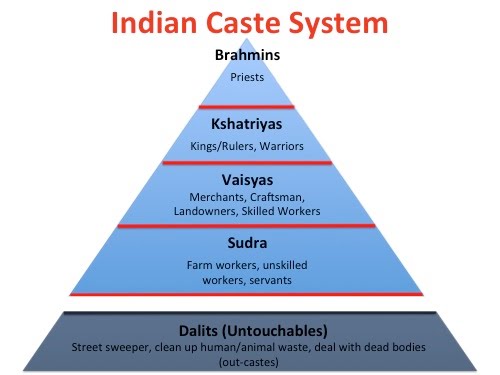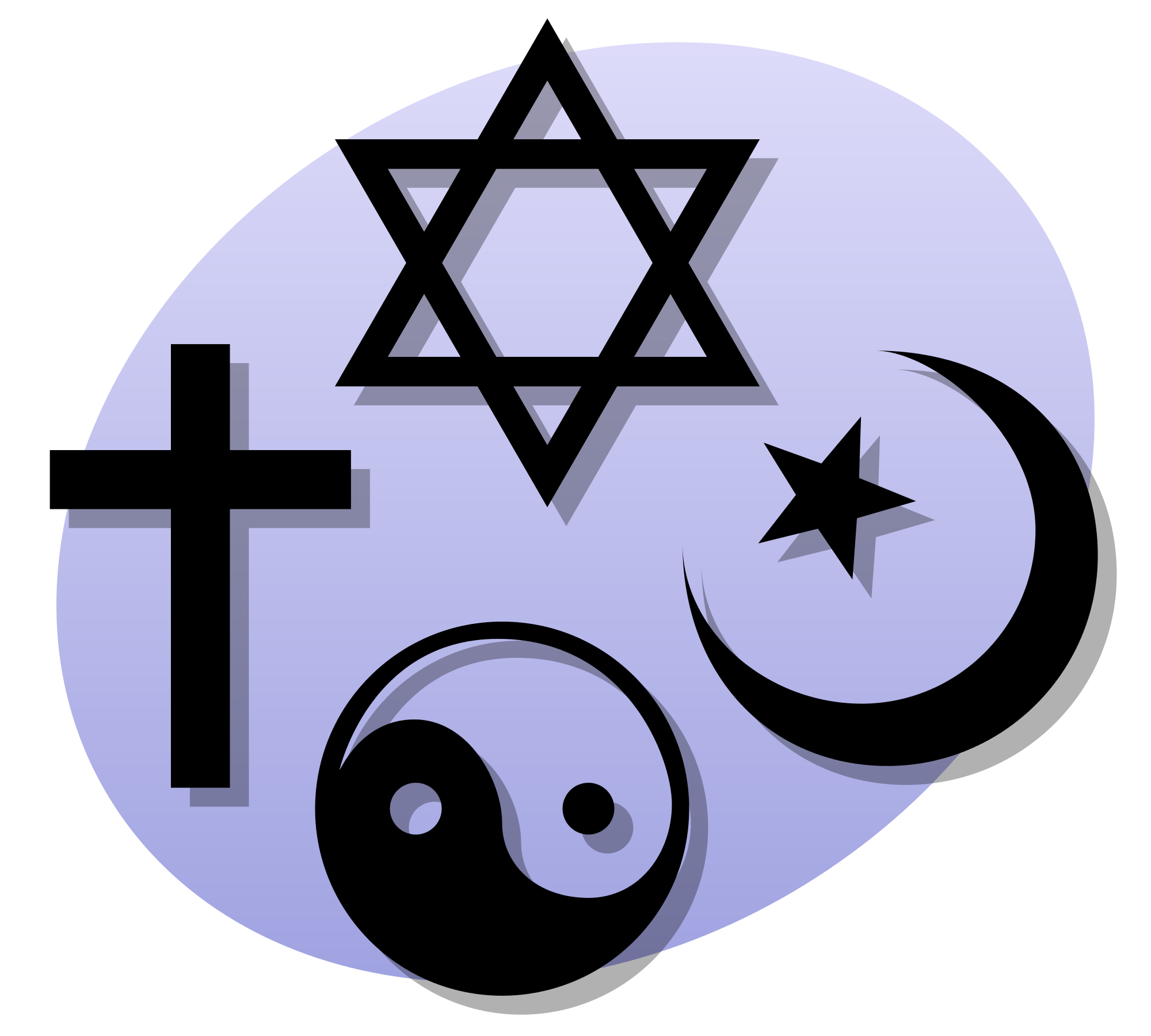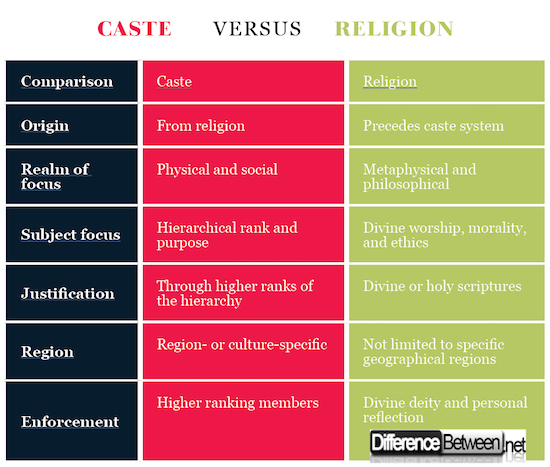Difference Between Caste and Religion

What is Caste?
Caste is a system of social stratification, or grouping of people according to wealth, income, occupation, or social status. Caste is characterised by endogamy (marriage within the same class), inheritance of a lifestyle often linked to occupation, social status or hierarchical status, and permitted social interaction and exclusions.
The word “caste” derives from the Spanish / Portuguese word “casta” that translates to “race, lineage, or breed.” Its modern use was introduced by the Portuguese in 1498, at their arrival in India.
Caste systems have been used throughout history and are present still today. It exists in various cultures and regions, however, is most often referred to as an example of the Indian social class system. Caste systems can be found among other places in India, Nepal, Sri Lanka, China, Korea, Japan, Ancient Egypt, Iran, and parts of Africa.
It is considered a rigid system of social distinction. The position in a caste system determines the value of a person, as well as certain benefits and social consent. People on the lower tiers of the system will have more restrictions, and exclusions. Within a caste system many things that might be desirable for in one class, might be avoided at all costs within another class.
Since caste is a hereditary system, one is born in the position and in most instances, it is nearly impossible to move to a higher position. People within a certain class of a caste system will often make decisions as a group, and individuality is lost as a member of the social class.

What is Religion?
There is no scholarly consensus about what religion is. Some have just plainly classified it as the “belief in the supernatural.” This is both incorrect and correct. Religion deals with supernatural in the sense that most religions have thoughts on the afterlife, a spiritual realm, a divine deity beyond understanding, and miracles. All these things deal with concepts that are beyond natural and therefore supernatural. Most religions do, however, not believe in ghosts, werewolves, vampires, and other fantastical and supernatural creatures or ideas.
The word “religion” is derived from the Latin religio, the meaning and origin of which is obscured by history. The word is most commonly understood along the lines of “worship for the Gods” or “Respect for that which is holy.”
Most often religion is understood as a belief system that worships a divine deity, or deities, through various practices, lifestyles, sacrifices, and prayer. The divine entity is most often seen as the creator of the physical world, and most often also the creator of the metaphysical. It is based on faith and believed regardless of proof. Depending on a person’s god-view the deity will have a direct or indirect influence on the physical world, and the lives of individual believers.
There is also the opinion that regards religion as any concern that ultimately overshadows all other concerns, and is seen as the basis for the meaning of life. Thoughts about the concern are revealed through a lifestyle that adheres to the understanding of the concern. Therefore many argue that Buddhism, in its various forms, is religious since thoughts and philosophies are actualised through a lifestyle unique to the belief system that is concerned with the meaning of life.
Religion ultimately deals with things deemed holy or important on a spiritual level for an individual. This, however, is a vague description but does include prophecies, holy sites, rituals, scriptures, holy articles, organizations, worshipping methods, songs, and movements.
Similarities between Caste and Religion
Just as there are different religions, there are different caste systems. In the same way as certain religions (however not always) are linked to a culture or region, so are the different caste systems linked to a culture and region.
Both can be seen as a certain set of rules to maintain order. They are similar in the sense that they both enforce a certain lifestyle and expectancy of individuals and groups.
Within Hinduism, the caste system is closely related to religion and is often confused as being the same concept. As with many other caste systems, religion is often used to confirm the credibility of the system and enforce the use of it. Therefore, in many cases, caste systems have been intertwined with religion to such an extent that it is seen as part of religious duty, and therefore creating similarities.
Examples, where religion was used to enforce caste systems, are the Dutch Reformed Christian church during the Apartheid regime of South Africa, and Hinduism enforcing the Varnashrama Dharma caste system still today.
Difference between Caste and Religion
Religion and caste are different in the main form of systems and purpose. While caste has a social purpose for the present structures and lifestyles of cultures, religion’s purpose is more often related to the future and aimed at a lifestyle in coherence with a deity’s example.
- Religion most often precedes a caste system, since most caste systems are derived from religious philosophy.
- While caste systems deal with social structures within the physical world, religion is focussed more on the metaphysical.
- Caste systems are based on systems dealing with hierarchical issues, while religion is focused on divine worship, morals, and ethical issues.
- Caste systems are mostly justified within the higher ranks of the system. Religion is justified within scriptures that are regarded as holy or divine.
- Caste systems are most often culture-specific, and while there are many variants of caste systems they are all identifiable within a certain region and culture group. The same religion can be found in different cultures, taking on different identities relating to the cultures, while maintaining the basic values and characteristics.
- Within religions, the judgement is most likely to lie with the deity worshiped and is enforced through a form of church and self-reflection. A caste system is enforced through a social collective, most often from the higher ranks.
Here is the comparison table for Caste verses Religion

Summary of caste verses religion:
Caste and religion are different in various aspects; they do have similarities and will relate to the same subject fields.
Caste has much to do with law, anthropology, and other fields in humanities, and will certainly relate to religious studies amongst them.
Religion will relate to the same fields, although having a dedicated study field of its own.
The perspective on the studies will, however, show the magnitude of differences, and that these two completely different concepts relate only minimally. It is possible to do a thorough study of religion without touching on the caste system. A study on caste systems, on the other hand, will almost definitely touch on the subject of religion.
- Difference Between Caste and Religion - May 4, 2018
- Difference Between Vedas and Upanishads - April 19, 2018
- Difference Between Atheism and Agnosticism - April 18, 2018
Search DifferenceBetween.net :
Leave a Response
References :
[0]Edwards, Rem B. Reason and Religion: An Introduction to The Philosophy of Religion. Eugene, Oregon: Wipf and Stock Publishers, 2016.
[1]Forrester, Duncan B. Caste and Christianity: Attitudes and Policies on Caste of Anglo-Saxon Protestant Missions in India. Routledge, 2017.
[2]Pruthi, R K. Indian Caste System. New Delhi: Discovery Publishing House, 2004.
[3]Image credit: https://upload.wikimedia.org/wikipedia/commons/thumb/2/28/P_religion_world.svg/2000px-P_religion_world.svg.png
[4]Image credit: https://upload.wikimedia.org/wikipedia/commons/e/e7/Indian_Caste_System.jpg
